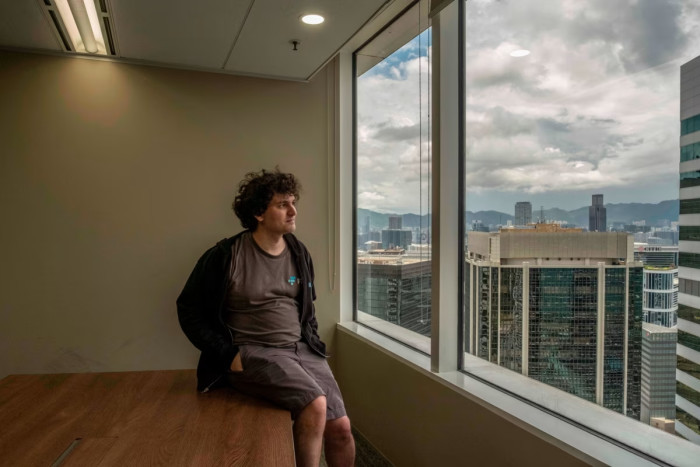Receive free World updates
We’ll send you a myFT Daily Digest email rounding up the latest World news every morning.
This article is an on-site version of our FirstFT newsletter. Sign up to our Asia, Europe/Africa or Americas edition to get it sent straight to your inbox every weekday morning
Good morning.
In results announced early this morning, the Labour party has exceeded its own expectations by winning almost 59 per cent of the vote in a by-election in Scotland.
Michael Shanks took 17,845 votes, or 58.6 per cent, in yesterday’s election in Rutherglen and Hamilton West, achieving a 20 percentage point swing that will boost confidence that Labour can end the dominance of the crisis-hit Scottish National party north of the border.
The pro-independence SNP’s Katy Loudon got 8,399 votes, or 27.6 per cent, in a seat that the party won by more than 5,000 votes in 2019. The Conservatives’ share collapsed to 3.9 per cent. Turnout was 37.2 per cent.
The margin of Labour’s victory, which was sparked by the ousting of former SNP MP Margaret Ferrier for breaking Covid-19 rules in 2020, will buoy hopes for Sir Keir Starmer’s party at the UK’s general election next year. Lukanyo Mnyanda has more details from Edinburgh.
Don’t miss Stephen Bush’s analysis on what the by-election win means for Labour in our Inside Politics newsletter, which comes out later today. Sign up here.
And here’s what I’m keeping tabs on today and over the weekend:
-
Economic data: France today releases trade balance figures, while Germany has data on factory orders and Halifax publishes its house price index for the UK.
-
Nobel Peace Prize: The winner will be revealed in Oslo today, capping a weeklong series of announcements.
-
Nato: Leaders in the military alliance meet in Copenhagen for the parliamentary assembly today.
-
UK Labour party: After its victory in Scotland, Britain’s main opposition party starts its annual conference in Liverpool on Sunday. Sir Keir Starmer has refused to commit to reversing the prime minister’s decision to shorten the HS2 high-speed rail line.
-
Elections: On Sunday, Luxembourg holds parliamentary elections, while the German state of Bavaria heads to the polls after a campaign in which the Greens have been subjected to threats and insults from hostile voters.
How well did you keep up with the news this week? Take our quiz.
Five more top stories
1. Metro Bank has sounded out rivals about buying a third of its mortgage book to help bolster its balance sheet. Shares in the UK challenger bank tumbled by almost 30 per cent yesterday, after news of a plan to raise up to £600mn from investors. The lender’s chair was called in to meet financial watchdogs the same day. Read the full story here.
2. A Russian air strike killed 51 people, including children, in eastern Ukraine yesterday in this year’s deadliest attack. The Russian missile hit a grocery store and an adjacent café in Hroza, a village in the region of Kharkiv, where locals had gathered after a funeral, said Ukraine’s interior affairs minister. Roman Olearchyk in Kyiv reports on the attack.
3. A US F-16 fighter jet has shot down a Turkish drone in northeastern Syria in what the Pentagon described as a “regrettable incident” that comes at a time of increased tensions between the Nato allies. A Pentagon spokesperson said the action had been taken in “self defence” but added that there was no indication that Turkey was targeting US forces. Our reporters in Washington and Ankara have more details.
4. More investors expect the Federal Reserve to be done raising interest rates after US borrowing costs surged this week. Yields on Treasury bonds reached their highest points in more than a decade, raising financing costs for businesses and consumers that could slow down the economy and tamp down prices without further action from the central bank. Read the full story.
5. The US securities regulator is taking Elon Musk to court over his refusal to testify in a probe into his purchases of Twitter stock and his statements surrounding the $44bn takeover of the platform. Before making his bid for the company, Musk had accumulated a 9.2 per cent stake in Twitter, now renamed X, which was above the 5 per cent threshold that triggers disclosure requirements. Here’s how his lawyers have responded.
News in-depth

Rishi Sunak cast his scaling back of the UK’s flagship HS2 rail project as the beginning of a revival for British transport, promising investment “that will make a real difference” to the country. But the prime minister’s decision to cancel the northern leg of HS2 sent shockwaves through a rail industry already struggling with the aftermath of the pandemic and now gloomily warning of “managed decline”.
We’re also reading . . .
Chart of the day
Nearly 100tn gigabytes of data were created and consumed last year, with the figure set to nearly double by 2025. To meet the relentless demand, developers are scrambling to expand the energy-intensive data centres that power every email, online article and crypto token.
Take a break from the news
Michael Lewis’s book Going Infinite traces Sam Bankman-Fried’s journey from friendless nerd to unflappable Wall Street trader, business tycoon and accused felon — all by the age of 31. The FT’s Brooke Masters reviews the book and three others that explore cryptocurrency’s boom and bust.

Additional contributions from Benjamin Wilhelm and Gordon Smith



Comments are closed, but trackbacks and pingbacks are open.